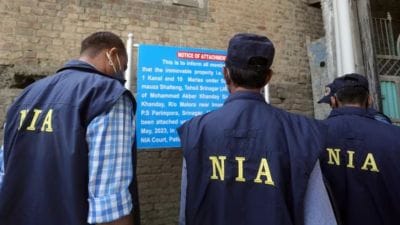Congress pays the price
The lead editorial in the latest issue of People8217;s Democracy says, 8220;The singular failure of the UPA government at the centre to check runaway inflation has had its political fallout,8221; referring to the poll verdicts in Punjab and Uttrakhand.

The lead editorial in the latest issue of People8217;s Democracy says, 8220;The singular failure of the UPA government at the centre to check runaway inflation has had its political fallout,8221; referring to the poll verdicts in Punjab and Uttrakhand. Evidently, the party feels that against the backdrop of the poll results there is good reason for the CPM to advise the UPA and Congress.
The party argues that inflation is not about increased liquidity resulting from high growth and supplies not being adequate to meet demand. Instead, claims the CPM, it is due to rising prices of all essential commodities. For this, the blame goes to futures trading and in the last three years 8220;there has been a whopping 600 per cent plus increase8221; in the value of commodities traded on the futures market.
Among the worst hit are farmers, who the editorial points out, are deprived of the benefit of higher prices as the trader commits much earlier to buy their produce. The CPM weekly has a suggestion: there must be 8220;increased pressures8221; from the Left to force a 8220;course correction8221; by the UPA.
Budget tricks
According to Prabhat Patnaik, despite the much-touted claims of making higher allocations for the social sector, Finance Minister P. Chidambaram has in fact 8220;quietly pursued his neo-liberal agenda8221; of opening up the economy to the 8220;vortex8221; of financial flows. He mentions that the minister wanted Indian firms to undertake capital expenditure abroad with borrowings from the Reserve Bank and warns that 8220;through measures such as these8221; the ministry is introducing capital account convertibility. 8220;Such introduction by stealth of capital account convertibility is one of the more insidious features of the budget,8221; writes Patnaik.
The economist says that Prime Minister Manmohan Singh identified two anti-inflationary features of the budget: Cuts in customs and excise duty, and the focus on agriculture. However, the budget 8220;carefully avoids8221; the issue of price support to farmers at a remunerative level.
According to him, the 8220;only meaningful measure8221; in the budget is the ban on forward trading of wheat and rice. Yet where steps should have been taken to ensure that tax revenue showed a significant rise relative to GDP, 8220;Chidambaram8217;s budget does not do so,8221; says Patnaik.
Culture of protest
National culture versus cultural nationalism was the subject of a discussion at a seminar, 8216;India Independent: Economics, politics and culture8217; reported in People8217;s Democracy and attended mostly by Leftists and Left-leaning participants. Many believed that with global capital becoming 8220;all pervasive8221;, cultural activists also need to find a global language and form of protest.
There are dangers too, like the 8220;impact of imperialism8221; and withdrawal of the state as a source of patronage. The cultural sphere is witnessing the 8220;concurrence of the imperialist and communal agenda8221;. Cultural activists have been victimised and gagged. Celebrated painter M.F. Husain8217;s prosecution, for instance, showed that 8220;communalism has become ingrained in our state structures8221;.
The report says: 8220;Even though the culture of resistance may not be high art8230; it still has to be respected for the protest it embodies.8221;
Compiled by Ananda Majumdar
- 01
- 02
- 03
- 04
- 05































